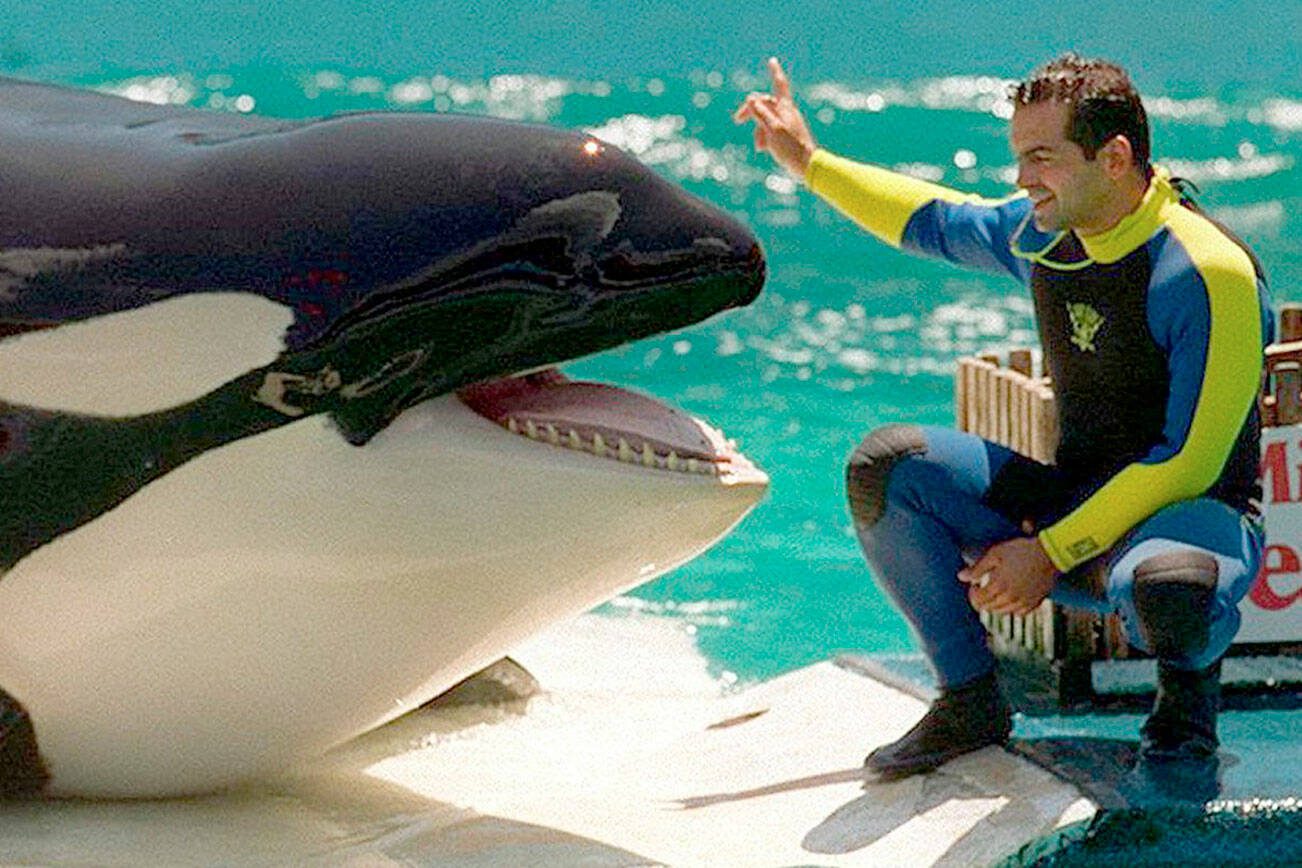By The Herald Editorial Board
There are risks, we’re reminded, to anthropomorphism, the tendency to attribute human traits, emotions and actions to animals and things, in particular for those who forget that animals in the wild are not residents of a petting zoo.
Yet that very human trait — particularly regarding our interactions with animals — isn’t without its purpose and benefit.
Which is why some good can come from mourning the death last month of Tokitae, the last orca held in captivity.
Tokitae, more famously known as Lolita, was a Southern Resident orca, a member of the Salish Sea’s L pod, who was captured in a roundup of killer whales in Whidbey Island’s Penn Cove in August 1970, a hunt that used nets, harpoons and explosives to drive and capture orcas for sale to aquariums and marine amusement parks. Tokitae spent more than 50 years in captivity at the Miami Seaquarium in a tank that measured 80 by 35 by 20 feet.
Along with the indignity of living in what was called the “smallest orca tank in the world,” Tokitae was trained and induced to perform jumps and tricks for audiences, but also suffered, even in her final years, malnutrition and disease. A September 2022 report by the USDA’s Animal and Plant Health Inspection Service found that the orca had been fed rotting fish, was being fed less than was typical, had injured her lower jaw during a jump and was made to perform jumps against a veterinarian’s instructions.
And though she had no understanding of it, her stage name — used in national and international media accounts, including in this newspaper in the reports of her death — should be of lasting embarrassment to those who called her that. Early in her captivity, Tokitae was named Lolita by her owners because she was kept in a pen with a much older male whale, a sniggering reference to the Vladimir Nabokov novel about a man’s obsession, kidnapping and rape of a 12-year-old girl.
Better she should be remembered as Tokitae or better yet as Sk’aliCh’elh-tenaut, the name given the orca by Northwest Washington’s Lummi Nation; pronounced SKA-li CHUKH-teNOT, “Sk’aliCh’elh” for the Whidbey cove where she was captured and “tenaut,” meaning a female relative.
Along with the family name, the Lummi Nation also led the effort to end the whale’s indignities and bring her home to the Salish Sea. As recently as this summer, those plans were proceeding, if not definite. The Lummi tribe, working with partners, has released a plan to return Sk’aliCh’elh-tenaut to the waters around the San Juan Islands, housing her in a large net-pen complex that would allow her far greater space to swim and dive, hear familiar sounds from the sea and be where “her home waters will embrace her,” a plan website detailed.
Those plans ended with a brief illness last month as the whale showed signs of discomfort, dying on Aug. 18 of apparent renal failure. The results of a necropsy are expected in the coming weeks, but the whale’s remains are to be cremated and returned to the Lummi Nation.
The previously planned dedication of a Lummi story pole to honor Sk’aliCh’elh-tenaut on San Juan Island’s Jackson Beach last Sunday became a memorial for the orca and included the playing of audio of what were said to be her last calls, radio station KUOW (94.9 FM) reported this week. Lummi officials said a date for a second memorial would be scheduled after her ashes are returned.
The return of Tokitae’s remains should mark a commitment to restoring the health of her home waters and assuring the survival of the orca’s family and the larger community of Southern Residents in the J, K and L pods.
Beginning with the capture of Namu in 1965 in a fishing net in British Columbia and continuing through the mid-1970s — even after passage in 1972 of the Marine Mammal Protection Act — some 270 orcas were rounded up and removed from the Salish Sea and other waters worldwide. Others, including four to five calves that drowned during the capture or were caught in netting at the Penn Cove location after the hunt’s end, died in the roundup.
By 1976, because of the captures, only 76 orcas remained in the three pods. Their numbers rebounded to a high of 98 whales as of 1995, but in the absence of Tokitae and the other captured orcas, those numbers have again declined, leaving about 74 whales among the three pods, according to the U.S. Environmental Protection Agency, which lists the Southern Residents as an endangered species.
Those left in the wild have struggled to thrive in a degraded environment, hampered by:
The decline in stocks of chinook salmon, which account for about 80 percent of the resident orcas’ diet;
Impacts from vessel noise and activity that hinder the whales’ communication and foraging for prey; and
The presence of toxic chemicals in the ecosystem from sewage and stormwater runoff and other sources that affect the health of the whales and their prey.
Five years ago, a state task force issued a report with 49 recommendations for policies, investments and changes to laws intended to improve conditions for the recovery of the Southern Residents and the Salish Sea’s transient orcas, with the goals of increasing chinook salmon runs, decreasing disturbances to orcas, reducing exposure to contaminants, addressing climate change and the impacts of growth and assuring funding and accountability toward those goals.
A state website lists each of those recommendations and their current status; and those efforts are underway, the report says. But they have yet to show results. The report had set an initial goal of improving conditions to allow the pods’ population to increase by 10 whales over the course of 10 years; five years of that decade have now elapsed, with no significant increase in population.
In remembering and honoring Sk’aliCh’elh-tenaut, those commitments to her remaining family and the rest of the Southern Residents should see renewed efforts to assure their success.
Talk to us
- You can tell us about news and ask us about our journalism by emailing newstips@heraldnet.com or by calling 425-339-3428.
- If you have an opinion you wish to share for publication, send a letter to the editor to letters@heraldnet.com or by regular mail to The Daily Herald, Letters, P.O. Box 930, Everett, WA 98206.
- More contact information is here.





